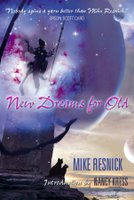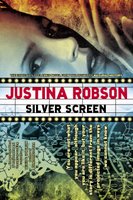Gabe Chouinard has posted at his site Urban Drift a long post that he styles a “Reviewerfesto Presented as an Excursive Essay Which May Actually Contain or Consist of a Review.” Gabe is lamenting what he sees as the sad state of online genre book reviewing, using Sean Williams’s The Crooked Letter (and to a lesser degree Scott Lynch’s The Lies of Locke Lamora – which I’m only about 40 pages into myself, but loving so far) as an example. Along the way he takes a few pot shots at other reviewers, including a few we’ve quoted here.
Now, I’ve got no desire to be drawn into the controversy about online reviewing to which Gabe alludes, nor is this the proper forum for it. Plus, while it’s true that I’d rather not see our own marketing copy repurposed undigested as the intro to a reviewer’s post, as a still relatively new imprint, the obstacle we face is obscurity not hyperbole. At this stage, we are grateful for every effort to help spread the word, and splitting hairs over the critical and linguistic strengths of individual critics and bloggers is best left to others. I will say I am opposed to the notion that every review must contain something negative simply for the sake of not being completely positive – and this is an opinion I formed when I was a journalist in Los Angeles in the mid-to-late 90s, not something born of my current position. At the same time, I think Gabe is essentially correct that a sea of hyperbole washes over deaf ears, whereas in-depth analysis may be more effective at driving reader interest. Certainly, Amazon maintains that good and bad reader reviews generates more curiosity about a title than straight positives – and while I don’t know how to test this, certainly there is credence to the idea being that everyone knows not every book is for every person, and controversy causes potential readers to wonder into which side of the debate they themselves would fall. I suppose a lot of it has to do with why you read reviews to begin with. I read John Clute, for example, when I want to contemplate the genre thinking eruditely about itself. This is the same impulse that lead me to subscribe to Science Fiction Studies, and the impulse behind my own nonfiction anthology Projections: Science Fiction in Literature & Film. But generally I read reviews – in conjunction with interviews – to help me keep abreast of more writers and novels that I possibly have time to read, to stay informed of what everyone else is doing, and to see if there are any new writers I might want to work with in anthologies and elsewhere. (Related: when I began working in science fiction professionally in 1995, I felt that I gave up my right to shield myself from spoilers.)
So, with the caveat that Gabe’s diatribe will have some shaking their heads in anger and others nodding theirs in agreement, and that his opinions while appreciated do not necessarily reflect my own, let’s sift through the “reviewerfesto” for some opinions about The Crooked Letter. While his review is not 100% positive – indeed a major point of his revewerfesto is to decry the 100% positive review – Gabe says some very interesting and perceptive things:
“The Crooked Letter has a lot of things going for it, not least of which is its position at the fringes of generic epic fantasy. To all appearances, Williams has written a densely plot-driven adventure novel a la any comparable Gigantor Fantasy Series. Yet this is a sly and effective bit of sleight of hand, because The Crooked Letter plays in a different ballpark altogether than, say, Terry Brooks’ latest novel. Hidden beneath the gloss of genre rests a multilayered treastise that presents a rather unique version of reality and the afterlife. At its heart, epic fantasy is a very morally conservative mode of fiction, concerned with maintaining the status quo of the author’s subcreated world. Usually, such fantasy relies upon a (tired-out, naive) clearly cut distinction between Good and Evil. Occasionally, however, a novel will come along that challenges the simplistic notions of most generic fantasy by presenting a multifarious, mature examination of morality, spirituality, mythology and magic. The Crooked Letter is one of those latter novels.”
Now, it might be worth noting here that Sean Williams wrote The Crooked Letter not only as the first book of a four book quartet, collectively known as The Books of the Cataclysm, but as a backstory for three different series. Before TCL, he published (currently only in Australia) a Young Adult series called The Books of Change, which first introduced his fractured, outback world of Stone Mages and Sky Wardens, a sort of Mad Max meets Earthsea environment of wizards and dune buggies. Then he wrote The Crooked Letter, which begins in the present (or in one of those 5-minutes-into-now type presents) and which explains how our world broke to become his world. The second book in The Books of the Cataclysm, The Blood Debt, jumps ahead about a millennium to his broken desert earth, picking up as it does so some of the characters – now adults – first introduced in his Books of the Change. (Note: I read the first two books of the adult series before I read the first book of the YA series and had no trouble following. You shouldn’t either.) A series for middle readers, The Broken Land, will follow in 2007 (again, in Australia only as far as I know at this time).
So, The Crooked Letter is backstory for all three of these “trilogies.” In fact, we debated publishing it as a stand alone and making The Books of the Cataclysm a simple trilogy, but ultimately decided against this – in part because the works already existed as a quartet in their Australian mass-market editions. Another possibility would have been to have published an omnibus of The Books of the Change as book two of a Cataclysm quintet, but the tonal shift from the Vellum slash Perdido Street Station-esque sophistication of The Crooked Letter to the lighter YA narrative of The Books of the Change, as well as the book long break before the events of TCL picked back up, would probably have made for an uneven read. Anyway, that’s just roads not taken and water under the bridge, fun to think about but neither here nor there, etc… but hopefully it gives you a sense of why TCL is such a sophisticated foundational work. If I hadn’t just referenced The Silmarillion in another post, I might be tempted to invoke it here.
But where Gabe intriguies me is here, where he puts his finger on the way in which Williams gets off the Campbell bandwagon, and in so doing seems to carve out something truly mythic:
“The Crooked Letter may look and read like any other ‘epic fantasy’ on the shelves… Most fantasy borrows liberally from the archetypes mapped out by Joseph Campbell in The Hero with a Thousand Faces, to the point of cliche. But Sean Williams digs deeper, creating a Jungian puzzlebox of not cultural appropriation, but cultural redistribution, cultural recombination. At once drawing upon world mythology and remixing it from a non-religious point of view, Williams manages to create a working mythology for the whole world, no matter what country the reader may hail from. Williams fills The Crooked Letter with allusions and samples compulsively, DJ Z-Trip on paper. Quotations litter the text, in epigraphs and exposition, building a separate realm that exists somewhere above and beyond the text itself, like the footnotes in Danielewski’s House of Leaves. The brothers’ journeys take the Aboriginal walkabout and transforms it into a literalized metaphor, where the spiritual journey is brought to the fore and enacted throughout the novel. For the careful reader… this journey creates a powerful exploration of the possibility of the spiritual while divorced from the dogma.”
Yes, that’s it. Particularly the line “drawing upon world mythology and remixing it from a non-religious point of view.” Williams – the atheist son of a minister with a fascination with comparative religion, set out with nothing less than the aim of constructing a believable “second realm” that could serve as the ur-reality that informed every world religion, as if his afterworld dimension leaked through imperfectly into human consciousness, and the plethora of spiritual systems that we have here is the result. In fact, and I hope he will forgive my saying so, we’ve joked about him accidentally spawning a cult. As he says, “First Church of the Cataclysm, perhaps? With the stated aim of stopping alien predators from eating our souls when we die by teaching acolytes the psychic equivalent of karate in order to prolong their afterlives? Hmmm. That’s certainly no nuttier than anything else out there. “
I’m also interested in Gabe’s thoughts about cultural redistribution, especially in light of this discussion on Vellum author Hal Duncan’s blog. (Disclaimer: I read Hal’s original post on the subject, but I link to his most recent, which is, like a lot of Hal’s pontification, lonnnnnnnnng and therefore as yet unread by me.)
But getting back to Gabe:
“Unlike stock-in-trade fantasy, The Crooked Letter has resonance, relevance. There is a message here that delves far deeper than a generic, simplistic Good is Good, Evil is Evil message. Compared to the fluffery of most fantasy on the shelves, The Crooked Letter is a masterpiece despite its minor flaws.”
Which is pretty much my opinion too, and what attracted me to this series in the first place.
Finally, Gabe also lays down some Pyr praise, which, after the long post above, I hope I can be excused for repeating here:
“Pyr has quickly and stylishly presented itself as the field’s All-New All-Good Industry Midlist, giving home to a plenitude of excellent works… Pyr represents a new kind of vitality in the field… Pyr releases, unlike most small press editions, are widely distributed to mainstream bookstores, thereby ensuring that perhaps – just perhaps – a curious reader may discover gems like Chris Roberson’s marvelous Paragaea, or the spectacular achievement of Ian McDonald’s River of Gods.”
Let’s hope. And thanks to everyone who helps spread the word, with or sans hyperbole.



